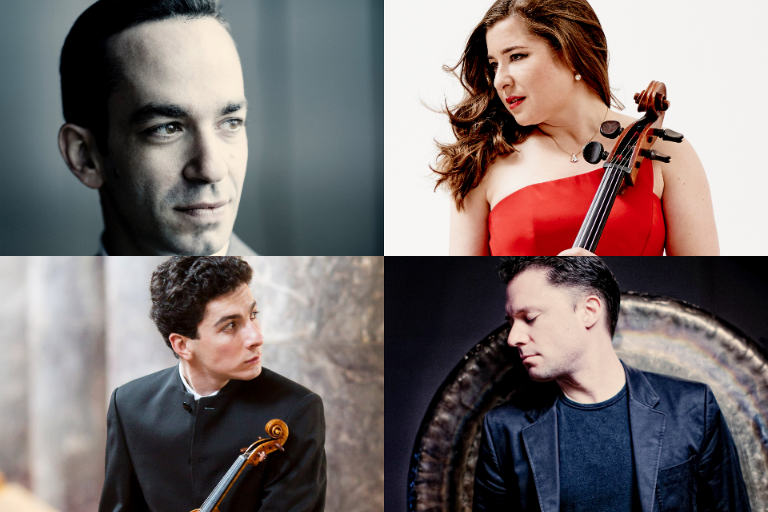Barnatan and friends bring esoterica alive in absorbing Harris program

Although local chamber music groups may not welcome the competition from outside, the fact remains that the Chamber Music Society of Lincoln Center has built a large and avid following for that intimate genre at the Harris Theater for Music and Dance, in the course of its eight annual residencies at the downtown venue.
It probably was only the confluence of competing classical events that kept attendance relatively low for “Transfigured Nights,” the generous and absorbing chamber program presented by four high-powered instrumental virtuosos Monday evening at the Harris as the concluding event of the theater’s 2018-19 season.
Pianist Inon Barnatan, who has appeared here under Chamber Music Society auspices on several occasions, headed an ensemble consisting of cellist Alisa Weilerstein (a frequent collaborator) and violinist Sergey Khachatryan. Barnatan and Weilerstein are familiar figures to Chicago audiences, while their recent colleague Khachatryan was making his local debut.
The most unusual of their offerings was Eduard Steuermann’s rarely heard transcription for piano trio of Arnold Schoenberg’s Verklarte Nacht (Transfigured Night).
Following intermission, another A-list solo artist, percussionist Colin Currie, joined the group for another rare transcription undertaken with the blessing of its composer – an arrangement for piano trio and percussion of Shostakovich’s Symphony No. 15 by Viktor Derevianko (who Barnatan studied under). The additional percussion players were Douglas Perkins and Michael Werner.
Regardless of one’s opinion of the intrinsic merits of each transcription (and there were serious reservations to be had about the Schoenberg-Steuermann), it was hard to imagine any chamber assemblage venturing so deeply into 20th-century chamber esoterica and achieving results of such impressive power and idiomatic flair.
Completed in 1971, four years before Shostakovich’s death, his Fifteenth Symphony may be regarded as the composer’s requiem for himself – a deeply tragic work whose somber mood is fleetingly relieved by bursts of bitter humor, the composer’s signature right up to the end. He peppered this long, dying fall with enigmatic references to other composers’ music – fillips of Wagner open the finale, and the “Lone Ranger” quotation from Rossini’s “William Tell” Overture in the opening Allegretto never ceases to induce audience chuckles – posing many questions but refusing to answer any of them.
The work boasts many chamber-music-like qualities, along with an elaborate percussion “skeleton” that Derevianko brings to the surface, thus putting the music in a startling new perspective. The arranger has done his job so well that one seldom misses the orchestra. (The withdrawn lament that is the slow movement actually feels more interior in this context.) Overall this adaptation stands as a useful and instructive corollary to the original.
One was grateful to encounter it in a performance of such highly charged intensity as the one these six superb players delivered Monday night. The Adagio section came off particularly well, its keening string lines resting on somber piano chords punctuated by pungent strokes of xylophone and timpani. The finale, with its fidgety death-rattle of multiple percussion, registered with a clarity you seldom hear in any performance of the original version. The six artists interacted with an electricity that leapt off the stage.
While Derevianko’s transmogrification of Shostakovich adds to one’s understanding of the original, Steuermann’s 1932 transformation of Verklarte Nacht diminishes the musical and dramatic impact of the work from its original 1899 version as a string sextet. Schoenberg’s yearning chromatic lines and restless post-romantic harmonies are made to feel almost conventional. But, then, any attempt to cram the multidimensional depth of the original into just piano, violin and cello was bound to fail.
That said, Monday’s trio did a beautiful job with this curiosity. The piercing sweetness of Khachatyran’s tone (the young man’s bow arm is a marvel) combined with Weilerstein’s finely controlled rhapsodic impulse and Barnatan’s supple phrasing and rippling assurance to make a silk purse of this rarity. Nice to hear once, but one wouldn’t trade the original, or the string-orchestra version, for that matter, for a minute.
Currie had the stage to himself for a solo-marimba work dedicated to him — the 2014 Realismos magicos by Norwegian composer Rolf Wallin. The titles of the 11 sections – the longest of which lasts just over three minutes, the shortest five seconds – derive from the titles of short stories by the magical-realist author Gabriel Garcia Marquez. As a means of displaying the wide range of colors, sonorities and surreal sonic poetry Currie can conjure from the marimba, the score is remarkably effective and a welcome addition to the slim repertory of solo pieces for the instrument.
Beethoven’s Piano Trio No. 5 in D major (the so-called “Ghost” Trio, Op. 70, no. 1) was the only concertante work on Monday’s program that isn’t a transcription. Barnatan, Khachatryan and Weilerstein subsumed their individual musical personalities to a style of Beethoven playing that was robust yet refined, energetic yet elegant, thoughtful yet spontaneous. The balancing of voices was sensitive at all times, while the movement that gives the piece its spectral subtitle brought a rapt introspection wrapped in tonal beauty. Here and elsewhere, Khachatryan proved himself a formidable chamber musician with soul.
The one disappointment was that Monday’s stellar ensemble failed to provide the audience with adequate program notes, merely a skimpy couple of paragraphs written by Weilerstein.
Posted in Performances




